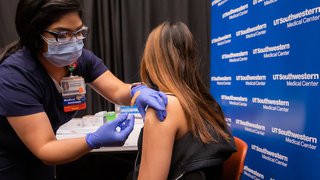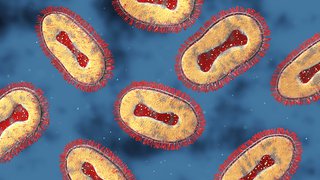Omicron boosters: Do I need another COVID-19 shot, and when?
September 12, 2022

Now that COVID-19 booster shots specifically tailored to fight the dominant Omicron subvariants are available, you’ve probably got questions. Such as:
- Do I really need another booster shot?
- What are the benefits of this new version of the vaccine?
- When should I get the shot if I recently had COVID-19 or a booster?
With the likelihood of a late fall/early winter COVID surge looming, the Centers for Disease Control and Prevention (CDC) has endorsed the updated COVID-19 booster shots as an added layer of protection against the variants of the SARS-CoV-2 virus and their continued spread.
Let’s take a closer look at the retooled vaccine and answer some of the most common questions about it.
Why do we need another booster shot?
There are two main reasons updated booster shots have been approved:
First, while the original vaccines continue to provide very good protection against serious disease or death from COVID-19, that defense wanes over time. In order to maintain high levels of protection, a boost to the immune system from a smaller dose of the vaccine can be helpful. This is particularly important for patients with weakened immune systems or those at highest risk for serious outcomes from COVID-19.
Secondly, the SARS-CoV-2 virus has continued to mutate, and some of the new variants are more contagious than the original strain. The variants are also able to partially escape the immune protection from prior vaccination or infection. A booster built to combat some of the latest viral variants is expected to provide increased immune protection.
How is this booster different from previous versions?
The first COVID-19 vaccines targeted one version of the SARS-CoV-2 virus – the original spike protein sequenced in January 2020. The new booster contains the original strain as well as the new Omicron subvariants, BA.4 and BA.5, the most prevalent among current cases. The goal is to generate protective immunity against the dominant subvariants circulating in the U.S. and reduce community spread.
Who is eligible for the new booster?
The Pfizer-BioNTech booster was authorized by the Food and Drug Administration (FDA) for people 12 and older who have received their full initial vaccine series with or without prior booster doses. Recipients also should be at least two months removed from their most recent vaccine dose. The Moderna booster was authorized for people 18 and older in the same circumstances.
How long should I wait to get the new booster?

At least two months from your last vaccine dose. Similarly, the CDC recommends that if you have a COVID-19 infection you should wait at least until you have fully recovered from being sick. The agency also notes you may consider waiting up to three months after having COVID-19 before getting a booster because natural immunity should provide some protection.
That said, when deciding how long to wait after having COVID, you should factor in your risk for serious disease from an infection, how much COVID-19 spread is in your community, and other medical considerations, which you should discuss with your doctor. For young, healthy adults, it is likely safe to wait up to six months after infection to get the booster, while those at higher risk will want to consider getting it sooner.
Why did the FDA approve this booster without human trials?
One of the advantages of the mRNA (messenger RNA) vaccine technology is that it allows updates to be made quickly to more closely match the circulating strains of a virus. The basic design of the vaccine remains the same, and data from more than a billion doses administered have shown that COVID-19 vaccines are very safe and effective.
Pfizer and Moderna have conducted human volunteer studies with the earlier Omicron BA.1 version of the vaccines, which showed similar safety and increased protective antibodies against Omicron strains. So, even though human clinical studies are still underway for the booster tailored to BA.4 and BA.5, the FDA, based on guidance from its expert panel, decided to approve it because those Omicron subvariants are dominant in the U.S.
It's worth noting that the flu vaccine is updated annually to match predicted circulating viruses without conducting large-scale clinical studies.
COVID-19 seems to have subsided. Why get another shot?
Although cases appear to have plateaued or declined, most experts, including UT Southwestern’s data modeling group, expect another surge in cases later this fall or winter. For those who are eligible, especially those who are immunocompromised or are at the highest risk of serious disease due to older age or underlying medical conditions, a new booster will provide added protection and help curb the spread of the virus in the future.
Fortunately, the risk of serious illness from COVID-19 has been greatly reduced by the initial vaccine series and booster shots. According to CDC data, people who have had one or two boosters have a 0.024% chance of being hospitalized with COVID-19. For people under 50, it's even lower – 0.014%.
However, the protection against any infection wanes with time. A booster dose can help reduce the risk of infection in the short-term. There also remains the potential risk of long COVID symptoms even following infections that aren’t serious enough to require hospitalization.
Can I get a flu shot and COVID booster at the same time?
Yes. The CDC indicates it is safe to receive the flu vaccine in the same visit as the new COVID-19 booster shot. Studies have confirmed the safety and effectiveness of the co-administration of these two vaccines.
Why haven't the vaccines provided longer-lasting immunity?
The COVID-19 vaccines continue to provide very good protection against serious illness and death. However, because levels of the protective antibodies decrease more quickly in the mouth and nose, and because SARS-CoV-2 is a respiratory virus, the protection against any infection has waned more quickly. In addition, the ongoing mutations in the virus have led to new subvariants – such as Omicron BA.4 and BA.5 – which are better able to escape the full immune protection provided by prior vaccination or infection.
I’ve never received a COVID-19 vaccine. Can I get the new version?
No. The vaccine updated to target Omicron subvariants was designed as a booster, so it contains a lower dose of mRNA – about half the amount of the original vaccine – and that might not be enough to provoke strong protection from the virus. If you have never received the COVID-19 vaccine before, you are recommended to complete the initial vaccine series with the original COVID-19 vaccines first.
When will the new booster be available to kids under 12?
The head of the FDA panel that oversees vaccine authorizations suggested it might be available to younger children in the next couple months.
For more information about COVID-19 vaccines, boosters, and how to schedule a vaccine appointment at UT Southwestern, please visit our COVID-19 vaccination website.











